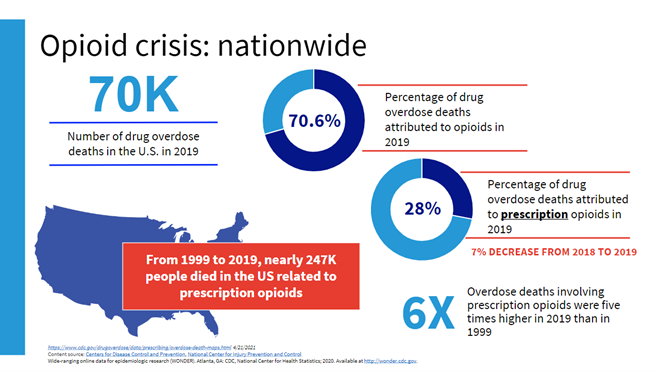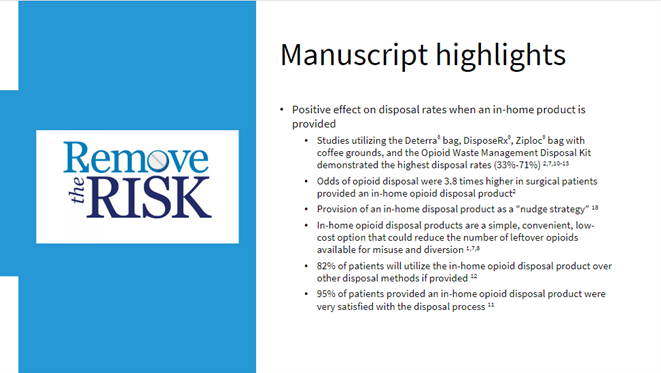Quality Forum Review: Increasing Safe Medication Disposal
The PQA Quality Forum Webinar is a regular, recurring series on healthcare quality topics with a focus on medication use and medication services. It is a forum for educating and engaging with PQA members and quality-focused healthcare professionals.
PQA’s April 21, 2022, Quality Forum welcomed a panel of experts to discuss the negative consequences of opioid over-prescription and their experience in dispensing in-home opioid disposal kits.
Mitchell Barnett, associate director of the Iowa Prescription Monitoring Program, opened the webinar by illustrating the growing opioid epidemic in the United States. Despite state-level differences, it is a national concern across all age groups. Barnett identified four pillars to combatting this issue: prevention, education, treatment/recovery, and PMP utilization.
 The Iowa Department of Health partnered with a prescription monitoring program (PMP) to reimburse community pharmacists for dispensing at-home disposal kits with active counseling. Unlike other disposal methods, disposal kits chemically and permanently inactivate the opioid when mixed with the pills and water, so there is no risk of retrieval. At $0 copay, there were 7,506 fills across Iowa as of March 2022. The program benefited both patients and pharmacies as the kits allowed for:
The Iowa Department of Health partnered with a prescription monitoring program (PMP) to reimburse community pharmacists for dispensing at-home disposal kits with active counseling. Unlike other disposal methods, disposal kits chemically and permanently inactivate the opioid when mixed with the pills and water, so there is no risk of retrieval. At $0 copay, there were 7,506 fills across Iowa as of March 2022. The program benefited both patients and pharmacies as the kits allowed for:
- Immediate disposal
- No return trips
- The opportunity for patient education
- No additional security concerns for the pharmacy.
Leslie Herron, owner of Sumpter Pharmacy in Iowa, was one pharmacy owner who participated in the program. Sumpter Pharmacy dispensed at-home disposal kits for post-surgical opioids and gradually expanded to interested patients. She now dispenses up to 100 packets per day.
Herron found the service generated a “tremendous amount of good PR in the community” and provided an opportunity to engage current patients and attract new ones. The service brought in an additional $5,000 in monthly revenue and facilitated discussions about naloxone use with patients. She noted that employee satisfaction has significantly improved since the implementation of this service, and she advised energizing staff through friendly contests.
John M. Edwards, acute pain service co-director at Baptist Health Lexington, presented his findings from a systematic literature review on the use of in-home opioid disposal products to enhance post-surgical disposal. He found that death by opioid overdose climbed from approximately 130 to 275 people every day in the United States in the past two years, with the primary source of diversion being leftover medications. The number one barrier to opioid disposal was the desire to save the medications for future use.
 Edwards’s review also found a positive correlation between the provision of standard opioid disposal products with active education by a healthcare facility and increased motivation of post-surgical patients to dispose of leftover opioids. There was an increase in disposal rates, preference and satisfaction among patients when using in-home disposal products over other disposal methods.
Edwards’s review also found a positive correlation between the provision of standard opioid disposal products with active education by a healthcare facility and increased motivation of post-surgical patients to dispose of leftover opioids. There was an increase in disposal rates, preference and satisfaction among patients when using in-home disposal products over other disposal methods.
Edwards assisted in setting up an opioid disposal program at the outpatient retail pharmacy at Baptist Health Lexington by leveraging savings from a 340B Drug Pricing Program. The facility provided an in-home disposal product to post-surgery patients with every filled opioid prescription through the Meds to Bed program.
Edwards recommends four strategies for opioid disposal:
- A disposal product for patients to dispose of unused post-operative opioids such as a Deterra bag, a DisposeRX pouch, an Opioid Waste Management Disposal Kit, or a Ziploc bag with coffee grounds with every filled opioid prescription.
- Education on safe use, storage, and how to dispose of unused opioids.
- One-on-one consultation with a healthcare provider preoperatively about what to do with unused opioids postoperatively, specifically addressing opioid disposal.
- A post-operative follow-up plan, implemented by a healthcare provider at a follow-up appointment to address unused opioid disposal.
All three experts concluded with the importance of countering the opioid epidemic in the United States with in-home drug disposal products and encouraging pharmacies and patients to try them.
You can listen to the full recording of this Quality Forum Webinar, a one-hour presentation with audience Q&A, on PQA’s YouTube channel. PQA members can access the presentation slides in the Member Resources Library.
Fay Hussain, a Class of 2024 Doctor of Pharmacy student from the University of South Carolina, is a PQA Summer Executive Intern sponsored by Pharmacy Quality Solutions.
